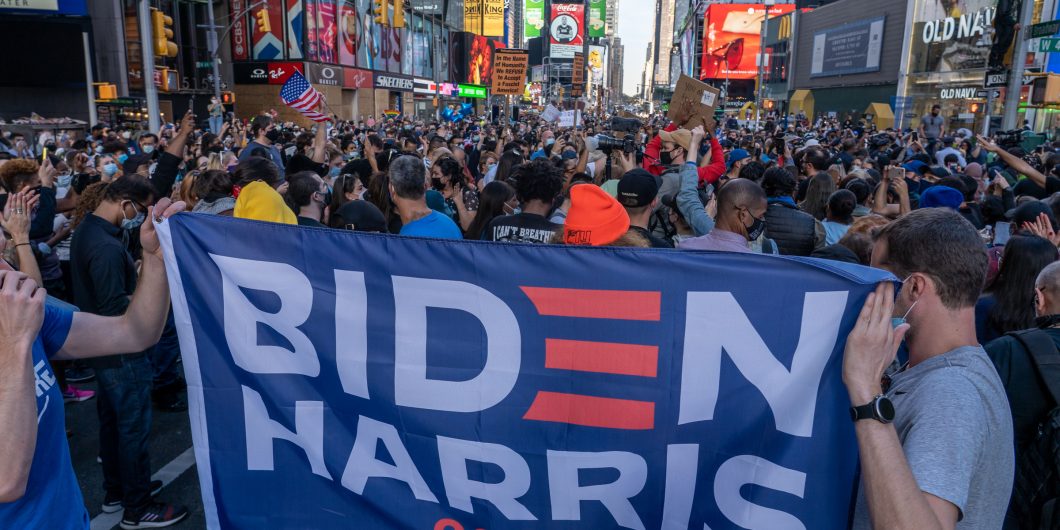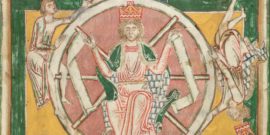America's civil religion narrows real religion in unfortunate ways.
Idolatry in Lockdown
No gods appear onstage in Sophocles’ Antigone. The Olympians never speak except through their messengers; what they do is seen, but they themselves are not. Sophocles left us three complete plays about the mythical past of Thebes, a city northwest of Athens. The gods preside over all three of them without a word. Even now, that divine silence speaks volumes about our own era of church closures and coronavirus lockdowns.
Sophocles’ gods are mute, but not absent. They loom over Oedipus the King as the tragic hero tangles himself in his own incestuous destiny. When Oedipus goes resignedly to his final rest in Oedipus at Colonus, the gods wait patiently beneath the gaping earth to receive him. For her part, Oedipus’ daughter Antigone is certain the gods demand a burial for her insurrectionary brother, Polynices.
The first audiences who gathered to watch Greek tragedy did so at a religious festival; they were well accustomed to seeing various members of their pantheon appear onstage.The whole plot of Antigone hinges on its title character’s conviction that she is obeying divine commands. Yet the gods maintain their inscrutable silence until it is too late. Where are they? Whose side are they on?
Westerners today are accustomed to thinking of Antigone as a battle between religious martyrdom and godless statism. A standard summary of the plot might go something like this: Antigone serves Olympus. She recognizes eternal principles which transcend even the harshest mortal grievances. Thus, though Polynices has tried to besiege Thebes, she says, “Hades yearns to have us all under the same law” (translations are my own).
Meanwhile Creon, the unyielding autocrat, will brook no burials for traitors. He thinks he can do as he pleases because “the city belongs to its ruler.” During World War II, powerful adaptations—Jean Anouilh’s in Paris and Bertolt Brecht’s in Switzerland—associated Creon with the Nazis and Antigone with the resistance. This has left modern audiences even more inclined to read the play as a morality tale: gods versus authoritarians. Heaven versus fascism.
But that’s too simple. Reduce Antigone to a battle between saint and sinner, and you miss something important about the play: there are no atheists in it. The story does not pit religion against irreligion; it pits two fanatics against one another. Creon, just as much as Antigone, is ablaze with the conviction that heaven endorses his cause.
This is what the great classicist Bernard Knox stressed in his 1982 introduction to the play: Creon also “believes that he has religion on his side. The gods, for him, are the gods of the city, which contains and protects their shrines, celebrates their festivals and sacrifices, and prays to them for deliverance.” Hence Creon’s indignant outburst when he finds himself disobeyed: “Have you ever seen the gods celebrate a traitor? / Never!”
There was real force to this argument for a Greek audience. The master orator Demosthenes applauded Creon’s dictum that patriotic duty must eclipse personal attachments. In the Athenian polis—the tight-knit community of citizens where Western political philosophy began—law and order was buttressed by a shared conviction that laws were sanctified by divine approval. It was thus a matter of the utmost urgency to defend the gods of the polis against all dishonor: recall that Socrates was sent to his death for “not believing in the gods the city believes in” (Plato, Apology 24b-c). Creon’s claim is that by attempting to unseat him, Polynices has blasphemed the gods themselves: “he came to burn their temples / …uprooting both their laws and their sacred land.”
The tragedy of Antigone is that Creon’s civic piety drives him headlong against a higher authority which he is totally unequipped to recognize. Antigone is unshakably devoted to what Kant called “the starry heavens above, the moral law within.” She does not need any oracular pronouncement: the commands she obeys are woven into the very fabric of the universe. She knows what is right, and will die for it. So she tells Creon:
I didn’t think your mortal proclamations
had the power to surpass the gods’
unwritten, unshakable laws,
which live forever—not today only, or yesterday,
but always, from origins unknown and unseen.
In Antigone, Sophocles faced up to a painful truth that would later vex Thomas Aquinas in his own meditations on human and divine commandments: though the right and proper role of human law is to enforce the will of God on earth, our limited and sin-hobbled minds can only partially grasp heaven’s infinite righteousness. And so despite what may be our best efforts to rule justly, we have to reckon with cases that explode our preconceptions and demand our fealty to a higher justice than our rules have provided for.
In such cases we either acknowledge the divine law or destroy ourselves in war against it, as Creon does. He only sees the truth when Tiresias, blind prophet, delivers a sonorous message of doom: “Yield to the dead!” he demands. Though it unsettled his audience, Sophocles saw and proclaimed that there is an ultimate power to which even kings must bend the knee.
The worship of the city versus the ultimate divine law: this is the real battle of Antigone, and it is exactly the battle we are in. All over the West, right now, we are witnessing a competition between rival and incompatible theologies. The only difference is that unlike Sophocles, we don’t realize it.
For months on end during the coronavirus pandemic, churches and synagogues have been shuttered by state and local edict. Last November, the Supreme Court struck down some restrictions on public worship in Roman Catholic Diocese of Brooklyn, New York v. Cuomo. In his concurring opinion, Justice Neil Gorsuch tartly implicated Governor Andrew Cuomo in a kind of favoritism that has been on full display across the country: “according to the Governor, it may be unsafe to go to church, but it is always fine to pick up another bottle of wine, shop for a new bike, or spend the afternoon exploring your distal points and meridians. Who knew public health would so perfectly align with secular convenience?”
Who indeed. On the face of things, what’s at issue here is insouciant hypocrisy and violation of the First Amendment: “At a minimum,” wrote Gorsuch, “that Amendment prohibits government officials from treating religious exercises worse than comparable secular activities.” The surface-level confrontation is between religious Americans and their secular—and thus at least ideally neutral—government authorities.
That may also be how Cuomo and Newsom see themselves: as secular guardians of government neutrality. But accept this account of things, and you end up with a fairytale narrative that’s just as oversimplified as any grade-school summary of Antigone: the godless state enforcing its impartial edicts against impassioned religionists who believe themselves to be following a higher moral law.
Thus the voices of Antigone and Aquinas can still be faintly heard beneath those of Thomas Jefferson and James Madison: the rights to life, liberty, and the pursuit of happiness may be protected by the government, but in essence they do not depend on any human ruler or law. They are “unwritten, unshakable”: come what may, they are ours, and it is ours to exercise them.
In fact, the real drama unfolding is much closer to that of the real Antigone: traditional believers, in their efforts to fulfil their duties to God, have met opposition from a new form of civic religion—one whose practitioners are as zealous in their own faith as they are oblivious to its existence.
In December, Washington, D.C.’s Mayor Muriel Bowser proclaimed that Washington would observe “Dr. Anthony S. Fauci Day” on the birthday of the man who “has been a shining light in dark times for the nation, promoting truth over fear and giving Americans hope in their government” as the president’s chief medical advisor. No mention was made in official documents of the fact that Dr. Fauci’s birthday falls on December 24th—Christmas Eve.
Earlier, Mayor Lori Lightfoot defended her willingness to celebrate Joe Biden’s electoral victory in a massive crowd while enforcing strict lockdowns in her city of Chicago: “There are times,” she declared, “when we actually do need to have relief and come together.” The Sabbath, apparently, is not one of those times. Then when Democrats won the Senate, too, Michigan Governor Gretchen Witmer told the world she was lighting a prayer candle featuring Stacey Abrams, the failed gubernatorial candidate whose local campaigning helped clinch the crucial races in Georgia, arrayed like a Catholic saint.
These are not religiously neutral statements. They are professions of faith in the government’s salvific power, made with pointed indifference to the traditions, prophets, and holy days of the Abrahamic faiths. Those faiths make certain claims which have always been troublesome to true believers in state religion, much as Antigone’s claims were troublesome to Creon.
For example: Christians believe that man’s soul is more than his body, and that God alone can save. Many also hold that, to paraphrase St. Augustine, “an unjust law is no law at all.” In service of those principles, believers all over the country have engaged in nonviolent civil disobedience against lockdown orders that would prevent them from worshipping together. They are up against not merely government overreach, but a competing religion with messianic ambitions.
In Dominion, his history of how Christianity transformed the West, Tom Holland writes: “The great claim of…‘secularism’ was to neutrality. Yet this was a conceit. Secularism was not a neutral concept.” In fact, it is a curiously Christian and rather precarious idea that religious impulses can be neatly distinguished from political or social mores. Older societies understood all major conflicts over values, like the one between Creon and Antigone, in religious terms. As Christianity loses its predominance over American life, this more primal mode of politics is asserting itself: once again, various religions are jockeying for total control of the public square.
Not only in coronavirus lockdowns, but in the unrest of summer 2020, when BLM activists demanded that passersby kneel and pledge allegiance to a new racial dogma, America’s traditional religions have entered into their fiercest conflict yet with rival faiths that know not what they are. These new and unnamed religions—religions of racial superstition, of mere survival at the cost of flourishing, of liberation from the biological realities of gender and death—are making bids for political and spiritual supremacy. Like Creon, the nascent clergy of these new faiths consider themselves qualified to be both final arbiters of morality and ultimate enforcers of the law.
Gradually, all this is becoming more explicit. One commentator wrote recently that “framing gender identity as something akin to religious belief/practice (with big caveats, of course) has helped me understand both myself and others.” This theology, though tacit until now, has always implicitly underwritten demands for such things as the legal enforcement of transgender pronouns. Under the false banner of secularism, Western politics has become a religious struggle once again.
Western Christianity took shape in opposition to the state religion of the Roman Empire. In America, though, Christians have had both the luxury of political majority and the protection of our founding documents, which recognize that our Creator’s justice transcends and precedes that of the state. Thus the voices of Antigone and Aquinas can still be faintly heard beneath those of Thomas Jefferson and James Madison: the rights to life, liberty, and the pursuit of happiness may be protected by the government, but in essence they do not depend on any human ruler or law. They are “unwritten, unshakable”: come what may, they are ours, and it is ours to exercise them.
I hope passionately that doing so will not mean for religious believers today what it did for Antigone. I am not predicting with certainty that it will. But I am saying that we must worship as we are called to, no matter how imperiously today’s would-be Creons and Caesars forbid it. If this is to disobey the law, nevertheless it is also to obey the power which legitimates all law. No one can say what the consequences of that obedience will be in the immediate future. But in the long term, those who hold fast to their faith will, in Antigone’s words, “please where it is most needful to please.” We must not seek, nor will we ever find, a greater reward than that.



